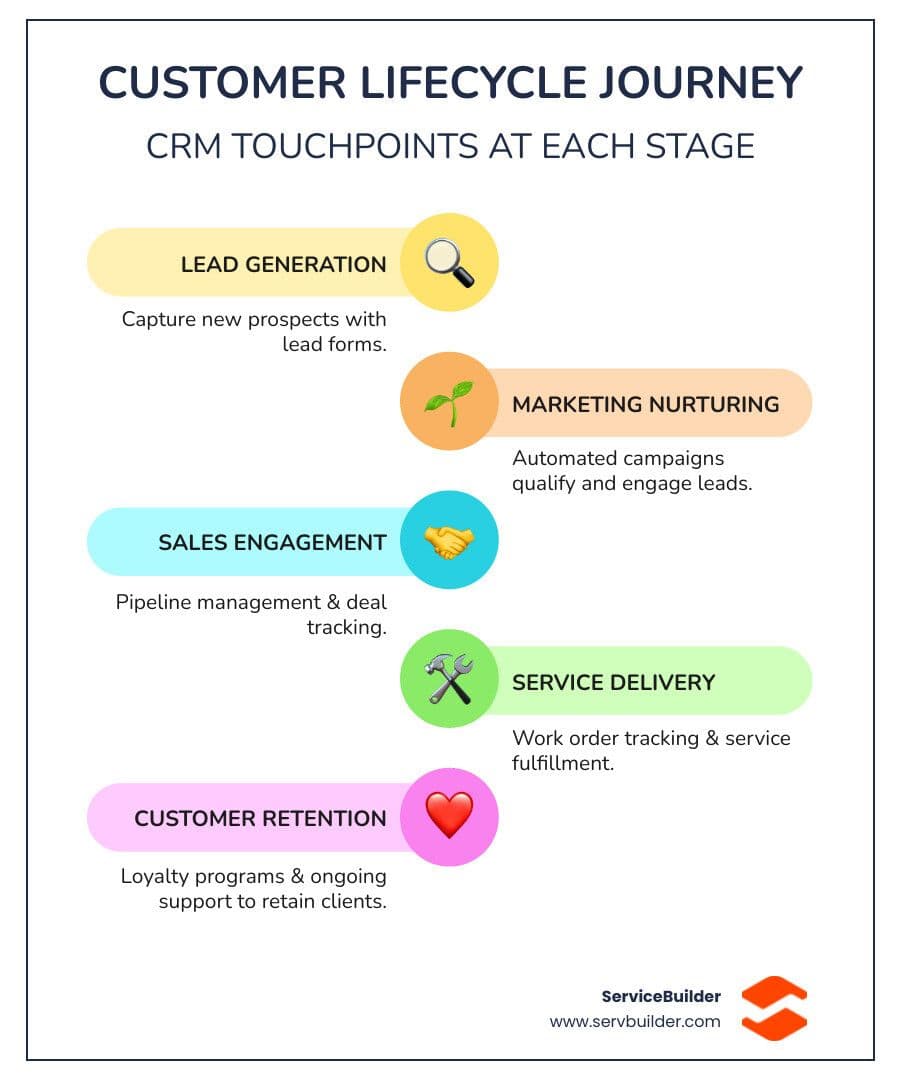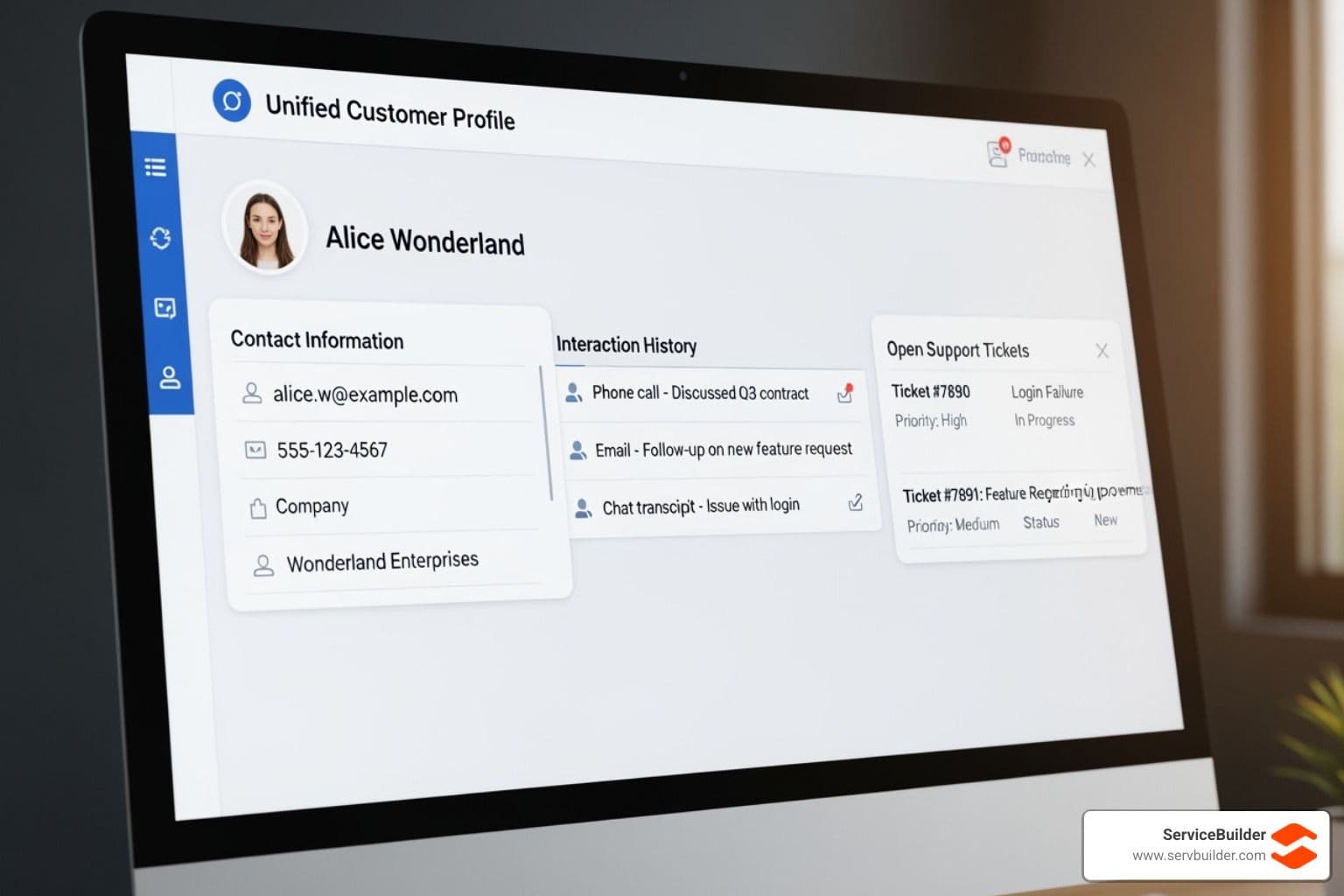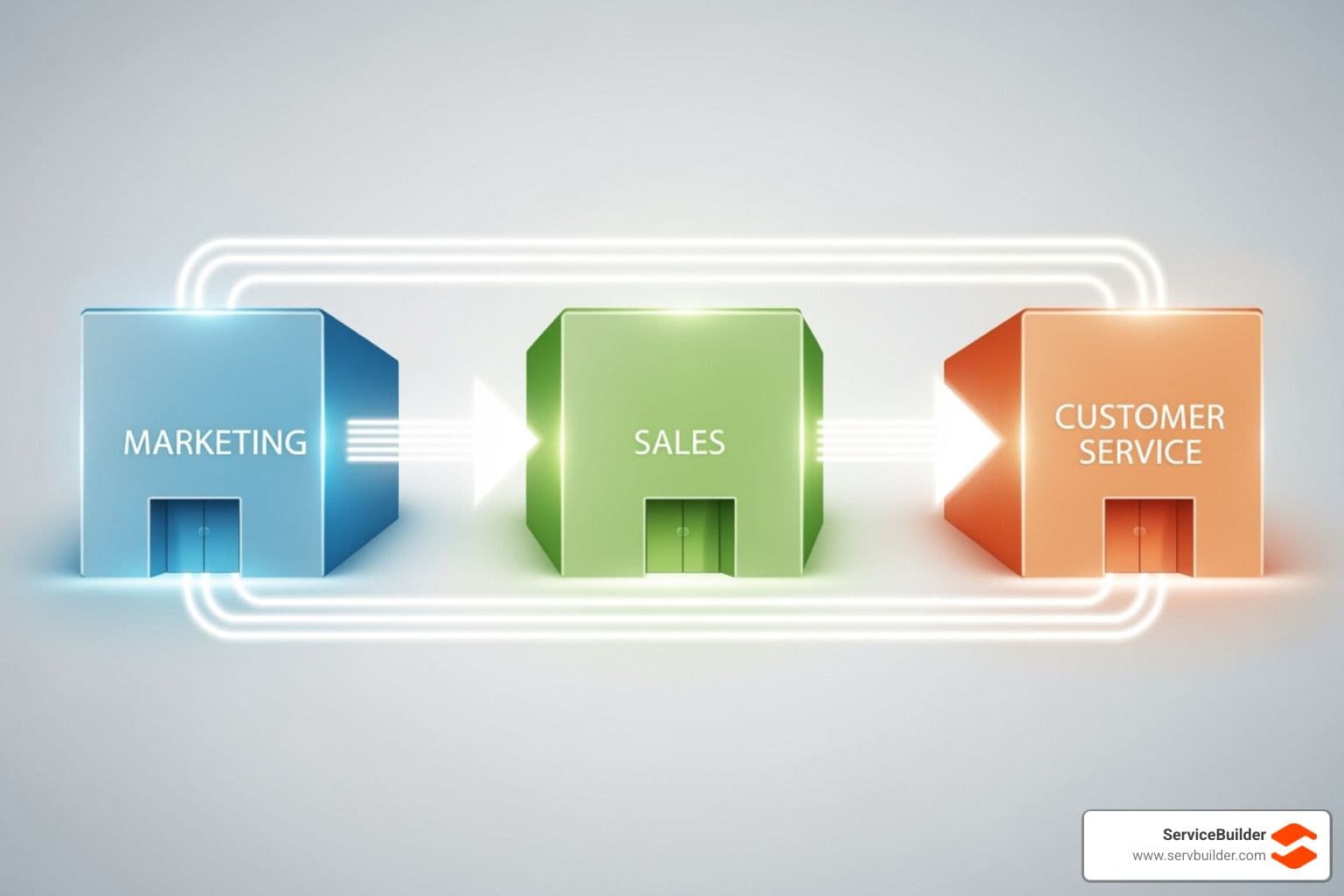CRM Tools Explained: Everything You Need to Know About Managing Customer Relationships
- Andrew Leger
Why Customer Relationship Management Tools Are Game-Changers for Service Businesses¶
Customer relationship management (CRM) tools are software platforms that help businesses organize, track, and nurture customer interactions. At their core, they:
Centralize customer data like contact info and communication history.
Automate workflows such as follow-ups and scheduling.
Track sales pipelines from first contact to closed deals.
Improve team coordination by sharing information across departments.
Generate insights to help you make better business decisions.
The results are significant. Salesforce users report a 30% increase in sales revenue and 32% better customer retention. This is crucial, as 70% of customers expect every representative to know their history with your company.
For service businesses, a CRM acts as a single source of truth for quotes, schedules, and communications, replacing scattered spreadsheets and notes. It breaks down data silos caused by disconnected apps—the average organization uses nearly 1,000 applications, but only 28% are integrated. A good CRM connects your tools and workflows, creating a seamless customer experience.
I'm Andrew Leger, founder of ServiceBuilder. With over 15 years of experience building systems for healthcare, staffing, and logistics, I've seen how the right customer relationship management tools can transform a service company's operations and drive growth.

Customer relationship management tools terms to learn:
crm
crm platform
What is a CRM Tool and Why is it Essential for Your Business?¶
Think of a customer relationship management tool as your business's digital memory bank. It helps you organize, track, and nurture every customer interaction, from their first inquiry to years down the road. More than just software, a CRM is a business strategy focused on building stronger relationships that lead to growth.
Without a CRM, a customer call can send your team scrambling through emails and files. With a CRM, your team instantly sees the customer's complete history and preferences. This is vital, as research shows that most customers expect anyone they speak with at your company to know their history. When you fail to meet this expectation, they may look elsewhere.
A CRM creates a "single source of truth" where all customer information lives. Your marketing, sales, and service teams work from the same playbook, creating a seamless experience that customers appreciate. Companies using CRM platforms see tangible results, including significant increases in sales revenue, deal closure speed, and customer retention.
The Core Benefits of a CRM System¶
Implementing the right customer relationship management tools changes how your business operates. Here are the key benefits for growing service businesses:
Improved customer satisfaction: When your team has instant access to a customer's history and preferences, you can provide personalized service that builds loyalty.
Better team collaboration: With shared information, your sales team knows what marketing promised, and your service technicians arrive prepared for special requests, eliminating confusion.
Data-driven decision making: A CRM helps you spot patterns in customer behavior, allowing you to make smarter business decisions based on data, not just gut feelings.
Streamlined operations: By automating routine tasks like data entry and follow-up emails, your CRM frees your team to focus on building relationships and solving customer problems.
Better customer retention: Consistently delivering exceptional experiences turns happy customers into loyal advocates who refer friends and family. For more on this, see our guide to Client Management Systems.
Managing Customer Data and Interactions¶
Customer relationship management tools excel at turning scattered information into an organized, actionable customer profile.

Contact management: A CRM acts as a digital filing cabinet for customer preferences, property details, and service history, eliminating the need to ask for information repeatedly.
Interaction tracking: It automatically logs every touchpoint—calls, emails, website visits—creating a detailed timeline of your relationship with each customer.
Data unification: Instead of being siloed in different systems, all customer information flows into one central hub, connecting everything from scheduling to billing.
Communication history: This historical context is a secret weapon for exceptional service, helping you anticipate needs and provide personalized care.
The goal is a 360-degree customer view, a complete picture of each relationship. This comprehensive understanding allows your team to engage thoughtfully and create memorable experiences. Learn how data structure supports this in our look at CRM Database architecture.
How CRM Tools Power Your Marketing, Sales, and Service Teams¶
When customer relationship management tools are implemented effectively, your entire organization begins to operate as a single, coordinated unit. Smart process automation handles routine tasks, freeing your teams to focus on building relationships and solving problems. Modern CRMs are also improved with AI, which can predict which leads are likely to convert and suggest the best times to reach out.

CRM Marketing Tools: From Lead Generation to Nurturing¶
CRM marketing tools help you find better leads and nurture them effectively. Basic capabilities include managing contact lists, segmenting audiences, and scheduling email campaigns. For example, companies using HubSpot Marketing Hub report a 505% return on investment over three years.
Advanced features like AI personalization tailor content to individual customer behavior, while predictive lead scoring analyzes data to identify which leads are most promising. This allows your sales team to focus their energy where it will have the greatest impact.
CRM Sales Tools: Closing Deals and Driving Revenue¶
CRM sales tools turn leads into paying customers by organizing the sales process. Pipeline management provides a visual map of every opportunity, so nothing falls through the cracks. Tools like Pipedrive excel at this visual approach.
AI sales assistants, like Zoho's Zia or the AI in Salesforce Sales Cloud, act as a tireless colleague that remembers every detail. They can suggest next steps, prioritize tasks, and even draft emails, helping users achieve faster deal closures and better win rates. These systems handle administrative work so your team can focus on selling.
CRM Customer Service Tools: Creating Raving Fans¶
Great customer service creates experiences that turn customers into advocates. CRM customer service tools help deliver this consistently. Key features include multi-channel support (phone, chat, email), ticketing systems to organize inquiries, and a knowledge base for self-service.
AI chatbots from companies like Freshworks or HubSpot can handle routine questions 24/7, freeing up human agents for complex issues. Advanced platforms like Zendesk: The Complete Customer Service Solution offer AI agents that work across any channel for more natural conversations, leading to higher customer satisfaction and faster problem resolution.
CRM Field Service Tools: Connecting the Office to the Field¶
For businesses with mobile teams, CRM field service tools are essential for keeping everyone synchronized. Core features include work order management and scheduling and dispatching, allowing the office to assign jobs and track progress in real-time.
Field teams get mobile CRM access to customer history and service notes, ensuring they have the information needed to do the job right. Inventory management helps track parts to avoid return trips. Cutting-edge features like IoT predictive maintenance use sensors to spot problems before they become emergencies, shifting service from reactive to proactive.
Modern platforms provide real-time updates, keeping customers, dispatchers, and managers informed. This level of coordination is critical for U.S. field service companies. Learn more in our guide to Field Service CRM System.
A Guide to the Different Types of Customer Relationship Management Tools¶
Just as you'd choose different vehicles for different jobs, customer relationship management tools come in several varieties to match specific business goals. Understanding these types helps you select the right solution for your needs, whether you're focused on daily operations, data analysis, or team synergy.

Understanding the Main CRM Categories¶
CRMs generally fall into three main categories, though many modern platforms blend elements of all three.
Operational CRM: This is the workhorse, focused on streamlining daily customer-facing processes in sales, marketing, and service. It automates tasks like lead generation, order processing, and service ticketing. HubSpot's CRM is a prime example, unifying tools for day-to-day efficiency.
Analytical CRM: This is the intelligence engine, designed to analyze customer data to uncover patterns, trends, and insights. It helps with customer segmentation, profitability analysis, and predicting churn. Zoho CRM with its AI assistant is excellent at turning data into actionable intelligence.
Collaborative CRM: This is the team player, built to break down departmental silos and ensure everyone shares the same customer information. It provides a unified view of each customer, so sales, marketing, and service are always on the same page. Salesforce's Customer 360 platform embodies this approach.
For more on different approaches, see our guide on CRM Solutions.
Popular Customer Relationship Management Tools on the Market¶
The CRM market offers a wide range of options. Here are some of the leading players:
Salesforce: The market leader, offering a comprehensive suite for sales, service, and marketing, powered by advanced AI. It's highly scalable but often comes with enterprise-level pricing.
HubSpot CRM: Known for its powerful user-friendly platform and a robust free tier, making it popular with small and growing businesses.
Zoho CRM: Offers a feature-rich platform with strong automation and AI capabilities at a competitive price point. Also offers Bigin for micro-businesses.
Microsoft Dynamics 365: A strong choice for businesses already invested in the Microsoft ecosystem, with seamless integration with Office 365 and Teams.
Pipedrive: A favorite among sales teams for its visual and intuitive pipeline management, which simplifies deal tracking.
Less Annoying CRM: Lives up to its name with a simple, straightforward interface and a flat monthly fee, ideal for small businesses avoiding complexity.
Copper: Designed for Google Workspace users, it automates data entry by pulling information directly from Gmail and other Google apps.
Other Noteworthy Options: The market also includes specialized tools like Freshsales (with Freddy AI), ActiveCampaign (combining CRM and email marketing), Insightly, Nutshell, and Vtiger.
How to Choose the Right CRM Solution for Your Business¶
Choosing the right customer relationship management tool is a critical decision that will shape your daily operations. The key is to understand your business's unique needs, both now and in the future.
Start by assessing your business size and industry. A small landscaping company has different needs than a large HVAC operation. Field service businesses, for example, often require specialized features like mobile work orders and GPS tracking that generic CRMs lack. This is where industry-specific solutions like ServiceBuilder excel.
Comparing Top Field Service CRM Solutions¶
While general-purpose CRMs offer broad functionality, specialized field service management (FSM) platforms are built from the ground up for businesses with mobile workforces. Here’s a look at a few leading options:
Jobber: A popular choice for small to medium-sized home service businesses. Jobber is known for its user-friendly interface and strong core features, including quoting, scheduling, invoicing, and a client hub. It's a great all-in-one solution for companies looking to streamline their day-to-day operations.
Housecall Pro: Similar to Jobber, Housecall Pro targets home service professionals and offers a comprehensive suite of tools for scheduling, dispatching, and payment processing. It stands out with strong marketing features, such as automated email campaigns and postcard mailers, to help businesses grow their customer base.
ServiceTitan: A powerful, enterprise-level platform designed for larger residential and commercial service companies (e.g., HVAC, plumbing, electrical). It offers advanced reporting, call booking, and marketing automation features but comes with a higher price point and more complexity, making it better suited for established businesses with dedicated administrative staff.
Consider your future growth. The CRM you choose should be able to scale with you. Also, evaluate the platform's AI capabilities, as features like predictive lead scoring and automated scheduling are becoming standard. For a detailed evaluation framework, Microsoft's CRM Buyer's Guide for Today's Business is a helpful resource.
Key Features to Look for in Customer Relationship Management Tools¶
When evaluating customer relationship management tools, prioritize these non-negotiable features:
Ease of use: An intuitive interface is crucial for team adoption. If it's not easy to use, it won't be used.
Customization: The ability to tailor fields, workflows, and dashboards to match your business processes is essential.
Scalability: Ensure the CRM can handle more users, customers, and data as your business expands.
Mobile access: For field service businesses, this is a must-have. Technicians need full access to CRM data from their mobile devices.
Reporting and analytics: The system should turn your data into actionable insights for growth.
Security: Look for robust security features like encryption and access controls to protect your data.
Integration capabilities: Your CRM must connect with other business apps to avoid creating data silos. The average organization uses nearly 1,000 applications, making integration vital.
The Growing Role of AI in Modern CRM¶
Artificial Intelligence is changing customer relationship management tools from static databases into intelligent partners. These AI features are already accessible and can help your business work smarter.
AI-powered insights: Modern CRMs analyze customer behavior to predict conversions and identify at-risk customers, helping teams focus their efforts.
Generative AI: AI assistants can now draft personalized emails, create marketing copy, and summarize customer interactions, saving significant time.
Advanced automation: AI can handle complex tasks like data entry, invoice processing, and route optimization for field teams.
Predictive analysis: AI can forecast which deals are likely to close and determine the optimal time to contact a prospect, providing a significant competitive edge.
Intelligent chatbots: AI-powered chatbots can qualify leads, schedule appointments, and handle complex service inquiries 24/7.
Platforms like Salesforce Einstein AI bring these capabilities to businesses of all sizes. To see how modern tools can help your service business, explore our guide on Client Management Software for Small Businesses.
Frequently Asked Questions about CRM Tools¶
Here are answers to some of the most common questions business owners have about customer relationship management tools.
What are the different types of CRM?¶
While many modern platforms blend functionalities, CRMs are typically categorized in three ways:
Operational CRM: Focuses on automating daily tasks in sales, marketing, and service.
Analytical CRM: Analyzes customer data to provide business intelligence and insights.
Collaborative CRM: Aims to break down departmental silos by sharing customer information across the entire organization.
Most businesses benefit from a system that combines elements of all three.
Are there free CRM tools available for small businesses?¶
Yes, several companies offer genuinely free customer relationship management tools that are great for getting started.
HubSpot CRM: Offers a robust free version with contact management, deal tracking, and basic marketing tools.
Bigin by Zoho CRM: A simplified CRM designed specifically for small and micro-businesses.
EngageBay: Provides a "free-forever" plan that includes contact management and lead capture forms.
These free options are perfect for proving the value of a CRM before committing to a paid plan.
How much does a CRM system cost?¶
The cost of a CRM system varies widely, much like the cost of a vehicle. Most providers use a per-user, per-month pricing model.
Free to Budget ($0-$20/user/month): Includes options like HubSpot's free plan and Less Annoying CRM (around $15/user/month). Ideal for basic needs.
Mid-Range ($20-$75/user/month): This tier includes popular tools like Pipedrive and paid versions of Zoho CRM, offering more advanced features and customization.
Enterprise ($75-$300+/user/month): Platforms like Salesforce and Microsoft Dynamics 365 fall in this category, providing advanced AI, extensive integrations, and dedicated support.
The final cost depends on the number of users, required features, and any implementation or training fees. Most providers offer free trials, allowing you to test the software before you buy.
Conclusion: Unifying Your Business Around the Customer¶
As we've seen, customer relationship management tools are more than just software—they are a strategy for putting customers at the center of your business. A well-chosen CRM becomes the nervous system of your company, connecting every department to provide a seamless and exceptional customer experience.
This unified approach is essential in a world where 70% of customers expect every representative to know their history. By creating a single source of truth and integrating your business applications, you can boost productivity and close deals faster.
Choosing the right tool depends on your unique needs. A small business might start with HubSpot's free CRM, while a larger enterprise may need the power of Salesforce. For U.S. field service businesses, however, a specialized solution is often the best fit.
A modern, mobile-first platform like ServiceBuilder streamlines your entire operation from quote to cash. It offers AI-assisted scheduling, real-time updates, and a privacy-first architecture, all without the bloat or high cost of enterprise systems. It's built specifically to help service professionals save time and scale faster.
The future belongs to businesses that truly understand their customers. With the right customer relationship management tools, you're not just managing contacts—you're building a foundation for sustainable growth.
Ready to see what a modern CRM can do for your field service business? Learn how ServiceBuilder can modernize your business and find why thousands of service professionals are making the switch.